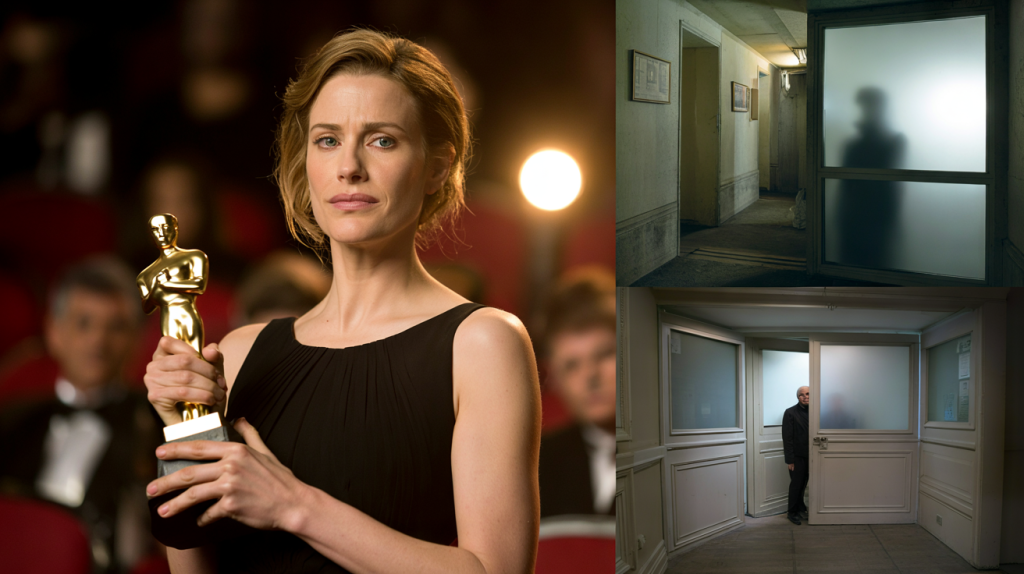A standing ovation, a held breath. On 22 February 2019, at the 44th César Awards in Paris, Léa Drucker was named Best Actress for “Custody”, the debut feature by Xavier Legrand. The ceremony took place at Salle Pleyel, and the room felt stunned, not by surprise, but by recognition.
The performance had cut deep. Léa Drucker, born 23 January 1972, delivered a mother under pressure, navigating a custody battle that quietly morphs into survival. In a country where, in 2018, 121 women were killed by their partner according to the Interior Ministry, the character’s fear did not play as fiction. It looked alarmingly familiar.
Léa Drucker, César Best Actress 2019 : the facts that matter
The César for Best Actress crowned a role anchored in reality. “Custody” was released in France in 2018 and zeroed in on the aftermath of a separation, seen through hearings, visits, and tiny moments where control reveals itself. Léa Drucker’s part is built on restraint, pauses, and a tension that sits in the shoulders more than in dialogue.
The win came at a pivotal edition for French cinema, the 44th ceremony on 22 February 2019. Xavier Legrand’s film had arrived as a first feature with momentum from festivals and critical praise. On the night, Léa Drucker, then 47, received the statuette that many observers had penciled next to her name after early screenings.
Context helps. The Césars are France’s national film awards, annually honoring work from the previous year. Best Actress is one of the night’s pulse points, a barometer of where the industry places its trust in both craft and subject. In 2019, that trust landed on a performance that refused theatrics and chose precision.
Why “Custody” earned Léa Drucker the César
Start with the first courtroom scene. No grand speeches. The camera watches faces. Léa Drucker barely raises her voice, yet the stakes rise because the character’s body tells a different story than her cautious words. That gap is where the fear lives, and she plays it with unsettling accuracy.
Viewers often expect a trial movie to draw clear lines between culprit and victim. “Custody” does the opposite. It maps coercive control through logistics, phone calls, doors, a car in a driveway. The role demands stamina and a calibrated intensity that never tips into melodrama. That is why it travels beyond one country or one legal system.
Numbers add weight to the reading. In France, police data documented 121 femicides in 2018, then 146 in 2019. The figure was publicly cited by authorities and turned into a national conversation. Léa Drucker’s character feels like part of that conversation, giving it a face when headlines were only numbers.
There is a common mistake when watching the film quickly on a small screen: missing the micro-signals. A glance to the judge, a hand held too stiff, breath clipped at the end of a sentence. Rewatch the early hearing and the exchange in the apartment hallway. The performance is a study in detail, and that is where the César jurors found the proof.
What this César changed for Léa Drucker
Award nights do not rewrite careers overnight, yet this one clearly widened the field. Casting shifted toward lead roles that carry moral complexity. After “Custody”, Léa Drucker anchored Catherine Breillat’s “Last Summer” in 2023, a film that entered Competition at Cannes and pushed her into another awards run.
The momentum held. At the 2024 César Awards, Léa Drucker was nominated again for Best Actress for “Last Summer”, while Sandra Hüller won for “Anatomy of a Fall”. That second nod matters: it signals consistency after the 2019 peak, not just a single triumph attached to one subject.
There is also a public perception change. For years, Léa Drucker was known as an incisive, versatile presence on stage et screen, niece of television figure Michel Drucker, solid across comedy and drama. Post-2019, her name often sits at the center of projects that adress intimate crises with societal echoes. Directors trust her with silence, with scenes that hang on a half-gesture. Audiences follow because the stakes feel lived-in.
All told, the 22 February 2019 win worked like a key. It unlocked roles that ask for discretion and long fuse emotion, the exact register where she excels. Watch “Custody” again with that in mind and the César choice reads less like a surprise, more like an inevitability inscribed in each frame.
